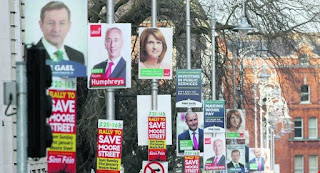 |
| Sinn Féin TDs: Children of a Lesser God? |
First, the next government will a coalition dominated by Fianna Fáil and Fine Gael. Second, there is no possible alternative to this arrangement. Third, it is the patriotic duty of certain smaller parties in the Dáil to make up the numbers in this coalition, and finally, there’s nothing very, very odd about points one to three as outlined.
The absence of any “now, wait a minute” impulse in all this is surprising. For instance, Pat Leahy of the Irish Times has written about the gulf in understanding between what the politicians thought the last election was about and what the people thought the last election was about. The politicians thought the election would be dominated by Brexit, and how things would break between Fine Gael’s expert handing of these delicate tripartite negotiations between Ireland, Britain and the EU, or else Fianna Fáil’s nobility and patriotism in giving Fine Gael a free hand to do what needed to be done.
The people, in their ingratitude, insisted on making the election about housing and health, subjects that were that much more real to the people’s own day-to-day lives and experiences.
The election was a reality-check for political consensus. Why, then, is it business as usual for the political establishment? Why isn't so shocking a result having a tangible effect in terms of governance?
One of the more thoughtful pro-Brexit arguments among our neighbours was the idea that, be it for good or for ill, the people had spoken. You may not like what they said, or you may be horrified by what they had said, but that they had spoken could not be denied. If Britain were a democracy, then politicians had no option but to accept the expressed will of the people.
There are not many buyers for that notion of accepting the expressed will of the people in - hateful phrase! - Official Ireland. Half a million citizens voted Sinn Féin in the general election. Where are those voices finding expression currently? Where is the pundit telling a Prime Time presenter that there is something wrong in the denial of that mandate? Where are the articles speaking for those half-million?
There are complexities to the situation. Governments are formed by seat-counts, rather than vote-counts, and if Sinn Féin did not run enough candidates to maximise their incredible vote, that is Sinn Féin’s problem and not anyone else’s. Of course this is true. But it doesn’t explain why Fianna Fáil’s 37 seats – not counting the Ceann Comhairle – count and Sinn Féin’s 37 seats do not, or why Fine Gael’s 35 seats count, and Sinn Féin’s do not.
The political commentary is reminiscent of the late Archbishop of Dublin, Most Rev John Charles McQuaid, preaching that nothing had changed after Vatican II. The 2020 general election voting was so revolutionary that the political correspondents are struggling to process it, and are trying to deal with it by pretending it never happened at all.
This is very dangerous thinking. If the election has been rendered null and void by COVID-19 fair enough; let’s have another election, and settle it that way. What’s completely out of the question is this ideas of ignoring the result of the election entirely. Ignoring the result of the election is a sure-fire confirmation that some people’s worst suspicions about the state are true.
Specifically, the suspicion that it doesn’t matter who you vote for, that there is a permanent government that doesn’t change, and that permanent government is run by faceless figures who are members of clubs to which you can never belong.
There was one particular factor in the last election that should have made all psephologists sit up and take notice. All through the history of the state, the Irish electorate has placed personality above politics. The Irish electorate votes locally first, nationally second. That’s why politicians attend so many funerals. If they don’t attend funerals, people won’t get to know them, and if they’re not known, they won’t get elected.
That went out of the window in the 2020 election. Sinn Féin had a TD elected in Kildare who went on her holidays instead of canvassing. Sinn Féin did not just get a blown-in elected in Clare, but a candidate who had blown in from Dublin. Dublin!
And these patterns repeated across the country. It’s all very well for pol corrs to be briefed by special advisors with stories about Shinners with British scalps around their tummy and pockets full of stolen money over big plates of Comeragh Hill lamb, spring vegetables and beautiful barley marjoram sauce. But it's too late to go bitching about the Shinners now.
Those Sinn Féin votes were cast all across the country, north, south, east and west, by rich people and poor people, by country people and townies, by people with nothing in common except a feeling that something has very wrong in a country where you obey all the rules and can’t afford a house for you and your family.
Politics is a contact sport and high-mindedness is a poor shield, but good God, how can so seismic a mandate be ignored? It is natural that Fianna Fáil and Fine Gael would seek to conserve their power – even if it is a little disappointing that there isn’t even some slight acknowledgement of how things have changed – but for the press, whose job it is to hold these jokers to account, to normalize Fianna Fáil and Fine Gael marginalizing of Sinn Féin’s democratically-expressed mandate is noticeably pathetic.
What should be particularly worrying is the question of how the half-million who voted for Sinn Féin will take the ignoring of their expressed wish and the confirmation of their worst fears. The guess here is: badly. Those who sow the wind will reap the whirlwind, and we might all be destroyed in the coming storm.

























